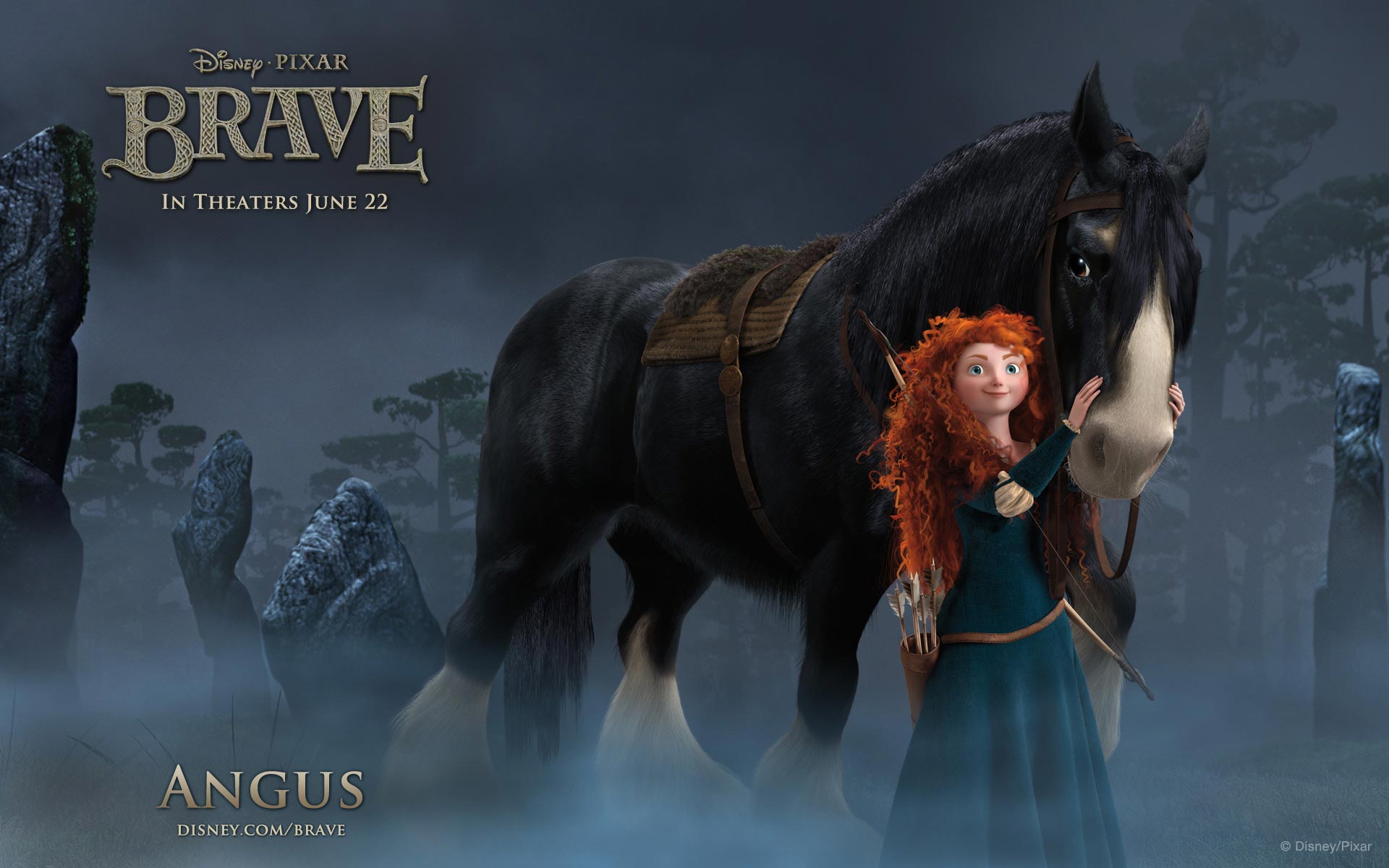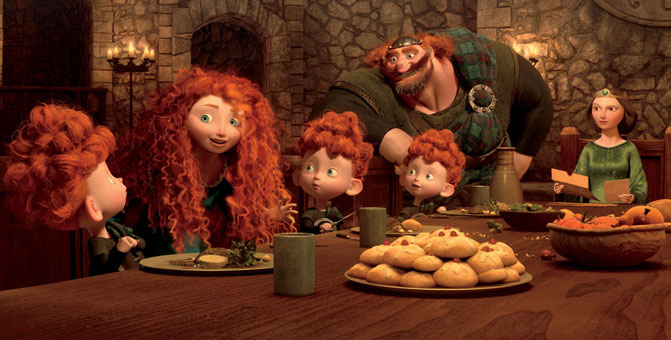Brave
Directed by Mark Andrews and Brenda Chapman, and co-directed by Steve Purcell
Written by Mark Andrews, Steve Purcell, Brenda Chapman, and Irene Mecchi
USA, 2012
At some point, the films from Pixar Animation Studios became so consistently powerful, so exceptional, that almost everyone in the world decided that making pieces of pure entertainment wasn’t enough. Because it felt like Pixar was raising and clearing the bar for itself on each of its films, the pioneering animation company only creating movies that are enjoyable and exciting without being uniquely excellent could be disappointing to some of the audience that grew up with their work. But Brave, Pixar’s 13th animated feature in 17 years, is consistently fun and engaging; that it’s not a 90-minute shot of cinematic perfection to the brain doesn’t turn the film into a black mark on the company’s record.
The major theme in Brave is the unique and strong bond parents have with their children, how quickly it can break, and how desperately important it is to mend that bond for everyone’s good. Though there are many parents and children among the cast, we focus on Merida and Elinor, princess and queen of the Scottish Castle DunBroch, respectively. Elinor wants Merida to be a proper lady and get married to one of the neighboring clans’ sons. Merida wants the freedom to do whatever she wants, including perfecting her archery skills and potentially never getting betrothed. As Elinor pushes her further, Merida, at her most desperate point, makes a fateful decision that…well, the less said about it, the better.
Their relationship is the foundation of the film, and is very well developed thanks not only to the performers—Kelly Macdonald as the voice of Merida and Emma Thompson as the voice of Elinor–but to the script, credited to directors Mark Andrews and Brenda Chapman, co-director Steve Purcell, and Irene Mecchi. The pacing of the film—including the end credits, it runs 93 minutes—is impressively swift and sleek. And yet, these belie some story issues. Criticizing a movie for being too short is perhaps rare, but so it is with Brave, which focuses almost entirely on Merida and Elinor, leaving the other human characters—from Merida’s immature father, the King, to the outrageous clan lords to Merida’s mischievous triplet brothers—as only wacky comic relief.
As such, Brave feels a little more small-scale than other Pixar films. One of many similarities the film has to other movies led by princesses in the Disney canon is a strict deadline delivered by a witch whose presence in the story is possibly the greatest surprise. Here, the deadline is two sunrises. (The details of this deadline are important for reasons too detailed and spoiler-y to get into.) But because of how quickly the film moves, the deadline arrives too speedily. Just as we’ve begun to connect with the characters, it’s suddenly time for the story to finish. The characters, even the goofy ones, are compelling enough that we want to spend as much time with them as possible. Getting 5 or 10 minutes more of Brave would’ve helped the world of the film feel more fully lived-in. As it stands, the film feels a bit slapdash. Yes, it’s worth praising the filmmakers for leaving us wanting more. But the more we want, the more likely it is that we’re left wanting too much.
What Brave may lack in its story department, it’s not lacking among the voice cast. Macdonald is the standout, her charming, lilting accent leading us through the film even when she’s the only character onscreen speaking English. Thompson and Billy Connolly, as the King, deliver spirited performances, as do Craig Ferguson, Robbie Coltrane, and Kevin McKidd as the three clan lords. But they’re so good that it’s criminal to have someone as fun and unpredictable as Ferguson in the movie and only give him two or three minutes’ worth of material. As expected, the technical aspects of Brave, especially Patrick Doyle’s score, are excellent, though the 3D the film is being presented in is at best unremarkable and—surprise—completely unnecessary. Considering the animation detail present in the nighttime scenes, stick with the 2D version of Brave.
Brave is solidly entertaining, and manages to wring genuine emotion out of its climactic moments despite the audience being totally aware that the film will not end darkly. (Seeing as this is a Disney movie, the phrase “spoiler alert” doesn’t seem warranted.) The film represents upward movement after Pixar fell so flat last year with its Cars sequel. But Brave is a film best experienced with tempered expectations. It’s easy to think of the film solely in context with Pixar’s other films, such as the unprecedented run of quality from Ratatouille to Toy Story 3. But doing so is a recipe for disappointment. Being entertaining, and just entertaining, isn’t automatically a bad thing, so though it may be a letdown that Brave isn’t as great as its predecessors, that doesn’t mean the film shouldn’t be considered on its own merits. Not everything can be exceptional—Brave is merely confident, assured, and enjoyable, which is no small feat.
Note. The short La Luna playing in front of Brave has a calmer tone than previous Pixar shorts, but the animation and story are simplistic, beautiful, and excellent. La Luna isn’t the best they’ve done—that remains Presto—but director Enrico Casarosa has created a fine addition to the Pixar shorts library.
Josh Spiegel




